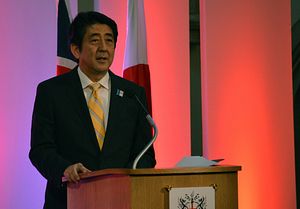In Japanese Prime Minister Shinzo Abe’s much anticipated speech on the 70th anniversary of Japan’s surrender to end World War II (read the full text in English), Abe encouraged Japan’s postwar generations to move on and not feel as if they must continually apologize for a war they did not start.
While he affirmed that previous apologies and expressions of remorse “will remain unshakable into the future,” he did not renew those apologies or offer any new ones, as some in neighboring countries, particularly China and South Korea, had hoped. Indeed, media coverage across the board note Abe’s carefully crafted speech “stops short of new apology.” Martin Fackler, former Tokyo bureau chief for the New York Times, writes via Twitter, “Emerging media consensus is that Abe repeated #Japan’s past #WWII apologies, but didn’t offer new one of his own.”
What specifically is the Korean news media saying about Abe’s apology-less speech? I surveyed my Korean media list on Twitter to get a sense of how the speech was received.
The list contains 17 members, including media outlets that span the entire political spectrum, from the conservative Chosun Ilbo to the consistently left-leaning Voice of the People. I looked only at the Korean-language media, under the assumption that coverage in Korean about Korea is more comprehensive. (English-language coverage, good though it is at times, shows only a snippet of coverage of any given issue, and often no coverage at all.)
The reception across the political spectrum is decidedly negative; Abe’s speech was called “insincere” and “disingenuous,” clearly not going as far as South Koreans demand. Here is sample (not to be taken as complete) of what Korean media tweeted (linking to their longer articles) about the speech:
Donga Ilbo: “Abe’s speech not clear about ‘truth of aggression and colonization.’”
Chosun Ilbo: “[Breaking] Abe does not apologize directly for aggression and colonialism: Japanese Prime Minster Shinzo Abe’s ‘70th anniversary marking end of war’ speech on August 14.”
Voice of the People: “Abe’s ‘disingenuous apology.’ Ruling party: ‘Regretful,’ Opposition: ‘shirking responsibility.'”
Hankook Ilbo: “Abe’s 70th year anniversary speech is ‘past tense’ apology… Disingenuous.”
Hankyoreh: “Civil society organization: ‘Abe’s speech insulting, a bitter pill to swallow.'”
These findings are unsurprising. As the Brooking Institute’s Katherine Moon notes in a recently published interview with the Kyunghyang Shinmun, “criticizing Japan has become such an integral part of Korean daily mentality.” In other words, it transcends political divides — in a way similar to nationalism.
As I’ve explained elsewhere, anti-Japanese sentiment is an integral part of Korean national identity. Troublingly, this conclusion suggests that overcoming strong anti-Japanese attitudes in South Korea is more than a political issue. It is going to take a more fundamental transformation, something that doesn’t appear to be happening — not now, anyway.

































